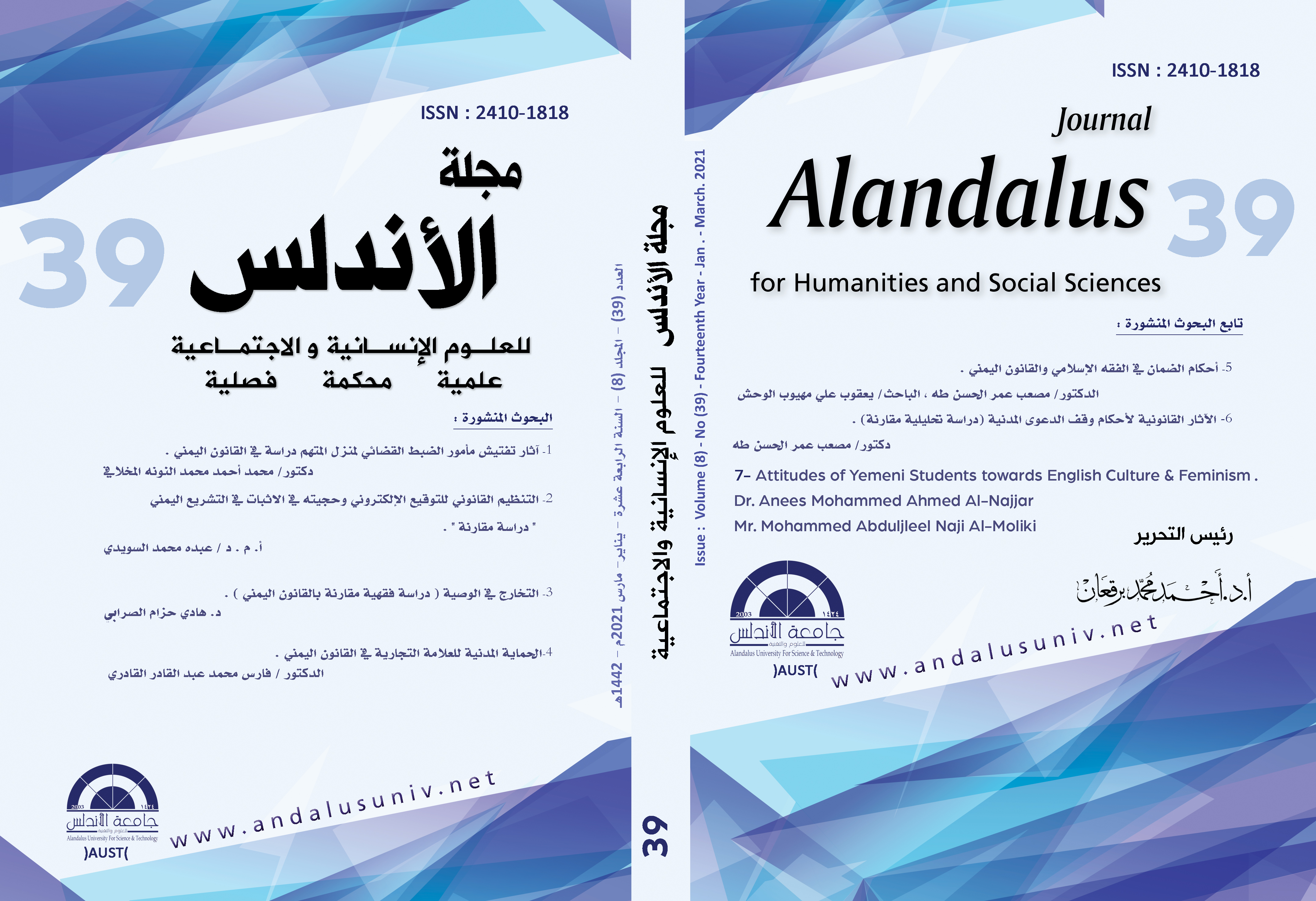اتجاهات الطلبة اليمنيين نحو الثقافة الإنجليزية والحركة النسوية د/ أنيس محمد أحمد النجار(1) أ/ محمد عبدالجليل ناجي المليكي
محتوى المقالة الرئيسي
الملخص
في السياق اليمني، يُعتقد أن الأدب الإنجليزي يوفر فرصة لطلبة اللغة الإنجليزية اليمنيين للتعرف على الثقافة التي يجسدها الأدب الإنجليزي. ومع ذلك، قد يواجه الطلبة اليمنيون بعض التحديات عند دراسة الأدب الإنجليزي؛ لأنه يحمل مجموعة من القيم والقواعد الأخلاقية التي تختلف عن تلك التي يمتلكونها. هدفت الدراسة الحالية إلى التعرف على اتجاهات الطلبة اليمنيين تجاه الثقافة الإنجليزية من خلال الآتي: (1) التعرف على اتجاهات الطلاب اليمنيين نحو ثقافتهم، (2) تحديد اتجاهات الطلبة اليمنيين للثقافة المستهدفة، أي الثقافة الأجنبية المضمنة في الأعمال الأدبية الإنجليزية، و(3) تحديد اتجاهات الطلبة اليمنيين نحو النظرية النسوية بوصفها في الأصل حركة غربية. لتحقيق أهداف الدراسة، استخدمت الدراسة المنهج الوصفي بأساليبه المسحية والتحليلية، حيث تم توزيع استبانة على (30) طالباً في قسم اللغة الإنجليزية، كلية الآداب، جامعة إب، اليمن خلال العام الدراسي (2018-2019). وقد تم اختيار هؤلاء الطلبة الثلاثين وفقاً لأسلوب المعاينة القصدية، كما تم اختيارهم بناءً على نتائج تحصيلهم الأكاديمي في العامين الماضيين. وتوصلت الدراسة إلى عدد من النتائج أهمها: أن اتجاهات الطلبة اليمنيين تجاه الثقافة الإنجليزية بشكل عام كانت إيجابية، حيث بلغت نسبة الاستجابة على البديل (موافق) على (78%)، بينما حصل البديل (غير موافق) على (14.8%)، والبديل (المحايد) على (7.2%). على الرغم من النتائج الإيجابية، فقد انتهى الأمر بالتشديد على أن طلبة اللغة الإنجليزية يجب أن يكونوا منفتحين عند الدخول في المناقشات بين الثقافات من أجل أن يكونوا قادرين على تقدير النصوص الأدبية الإنجليزية وتجاوز الاختلاف الثقافي. وخلصت الدراسة أيضًا إلى أن سد الفجوة الثقافية يمكن تحقيقه من خلال تضييق المسافة بين الطلبة والنص من خلال مراجعة المنهج الحالي الذي يدرسه الطلبة، ودمج النصوص التي تناسب احتياجات الطلبة وتفي بمتطلبات العالم المعاصر.
الكلمات المفتاحية: الطلبة اليمنيون، الأدب الإنجليزي، الحركة النسوية، الثقافة، الاتجاهات
تفاصيل المقالة
المراجع
AlMaleh, L. (2005). English Literature and Arab Students. Academic Exchange Quarterly , 269-274.
Al-Maqtri, M. (2004). Is it Language or Literature. The University Researcher Journal , 52-61.
Al-Maqtri, M. (2011). Literature from the Learner's Perspective. The University Researcher , 1-14.
Assa'd, J. (2012, March 26). Yemen's Wave of Feminism: Women's Growing Role in Politics. Retrieved November 18, 2020, from https://www.albawaba.com/editorchoice/yemens-wave-feminism-womens-growing-role-politics-418472
Atay, D. (2009). The Role of Intercultural Competence in Foreign. Inonus University Journal of the Faculty of Education, 10 (3), 123-135.
Beauvoir, S. D. (2009). The Second Sex (trans.). NewYork: Vintage Books.
Beers, K. (2016, July 11). Why We Must Read Literature. Retrieved August 5, 2018, from Tyrolia: https://kylenebeers.com/blog/2016/07/11/why-we-must-read-literature/
Bose, M. (2004). The Curriculum of the four-year English offered in the Faculties of Artsvin Yemeni Universities. The University Reseacher Journal , 23-32.
Buttjis, D. (1990). Teaching foreign language and culture: Social impact and political significance. The Language Learning Journal, 2 (1), 53-58.
Byram, M. (2003). Context and Culture in LanguageTeaching and Learning (ed). Oxford: Short Run Press Ltd.
Byram, M. (1997). The sociocultural and inter-cultural dimension oflanguage learning and teaching. Strasbourg: Council of europe.
Congreve, W. (2006). The Way of the World: A Comedy. New Delhi: P.T. Book Stall.
Conrad, J. (2006). The Nigger Of The "Narcissus" A Tale Of The Forecastle. NY: Doubleday.
El.Sadawi, N. (1980). The Hidden Face of Eve: Women in the Arab World (trans). London: Zid Books Limited.
El-Helou, H. A. (2010). Difficulties Facing English Teachers in Teaching Literature in English for Palestine Grade Twelve Textbook. Academia.edu , 1-167.
Fawcette, R. (2013, March 22). AlJazeera. Retrieved November 20, 2020, from The restoration of human dignity in the women of Yemen: https://www.aljazeera.com/opinions/2013/3/22/the-restoration-of-human-dignity-in-the-women-of-yemen/
Friedan, B. (1963). The Feminine Mystique. NY: W.W Norton& Company.
Frost, R. (2007, May 14). Education By Poetry. Retrieved May 20, 2020, from moodyap: http://moodyap.pbworks.com/f/frost.EducationByPoetry.pdf. Sep. 2020.
Gowinda, M. (2017). Implementation of Reflective Development Model in Improving Intercultural Competence . Journal of Education and Practice , 1-7.
Haggan, M. (1999). A Linguist’s View: The English Department Re-visited. English Teaching Forum , 22-27.
Hamdan, A. (2006). Arab women’s education and gender perceptions: An insider analysis. Journal of International Women’s Studies , 52-64.
Hashim, I. (1999). Reconciling Islam and feminism. Gender and Development , 7-14.
Lee, W. (1995). Authenticity revisited: text authenticity and learner authenticity. ELT Journal , 323-328.
Leveridge, A. N. (2020). The Relationship Between Language & Culture and the Implications for Language Teaching. Retrieved July 15, 2020, from Tefl Net: https://www.tefl.net/elt/articles/teacher-technique/language-culture/
Obeidat, M. (1997). Language vs. Literature: in English Departments in the Arab World. Research Gate , 1-10.
Obeidat, M. (1996). The Cultural Context of American Literature:A Barrier or a Bridge to Understanding? Journal of American Studies of Turkey , 37-44.
Prasad, A. (2004). English literature teaching in Yemen : problems and prospects. AlBahith AlJamiai (6), 1-22.
Rabadi, S. (2013). Arab Women and Higher Education: Perceived barriers and strategies to overcome. Illinois: Olivet Nazarene University.
Rajihy, H. A. (2013). Teaching English Literature in the undergraduate level in Yemen: Problems and Prospects. National Journal of Extensive Education and Interdiscipilinary Research , 1-3.
Salih, M. (1986). From Language to Literature in University English Departments. English Teavhing Forum , 25-28.
Sen, A. (1999). Development as Freedom. New York : Anchor Books.
Sharyan, A. (2003). Literature and Language Teaching: A Classroom centered Study. The University Researcher Journal , 383-402.
Thanasoula, D. (2001, January 14). The Importance Of Teaching Culture In The Foreign Language Classroom. Radical Pedagogy , 1-25.
Vandrick, S. (1995). Teaching and Practising Feminism in the University ESL Class. TESOL Journal , 4-6.
Wilde, O. (1890). The Picture of Dorian Gray. Planet Ebook.
Wollstonecraft, M. (2007). A Vindication of the Rights of Women. NewYork: Pearson Longman.
Zid, M. B. (2015). Arab Students’ Perspectives on the Value of Literature. Academy Publication , 927-933.
Zughoul, M. (1983). The Unbalanced Programs of the English Departments in the Arab World. In E. D. Ibrahim, The first conference on The Problems of Teaching English Language and Literature at Arab Universities. Amman: University of Jordon.

